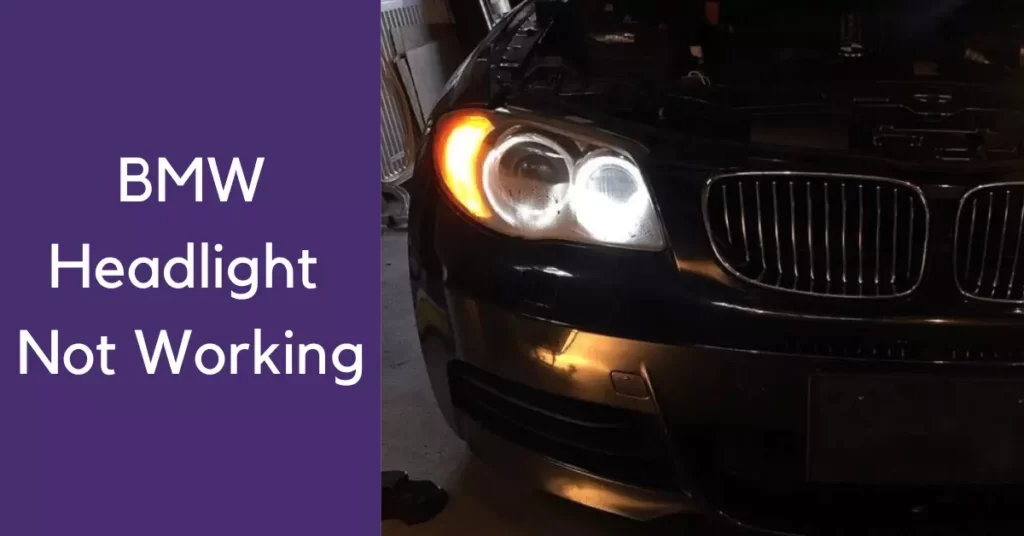
BMW (Bayerische Motoren Werke) is a German automotive manufacturer that produces a wide range of cars, including sedans, SUVs, sports cars, and electric vehicles. BMW cars are known for their performance, engineering precision, and advanced technology. Some popular BMW car models include the 3 Series, 5 Series, X5, and i3.
If you have a BMW and its headlight is not working, you may be feeling frustrated and confused. You don’t have to worry because, in this article, I will discuss top BMW headlight problems based on my experience and knowledge.
Common Problems with BMW Headlights
1) Broken Headlight Bulb
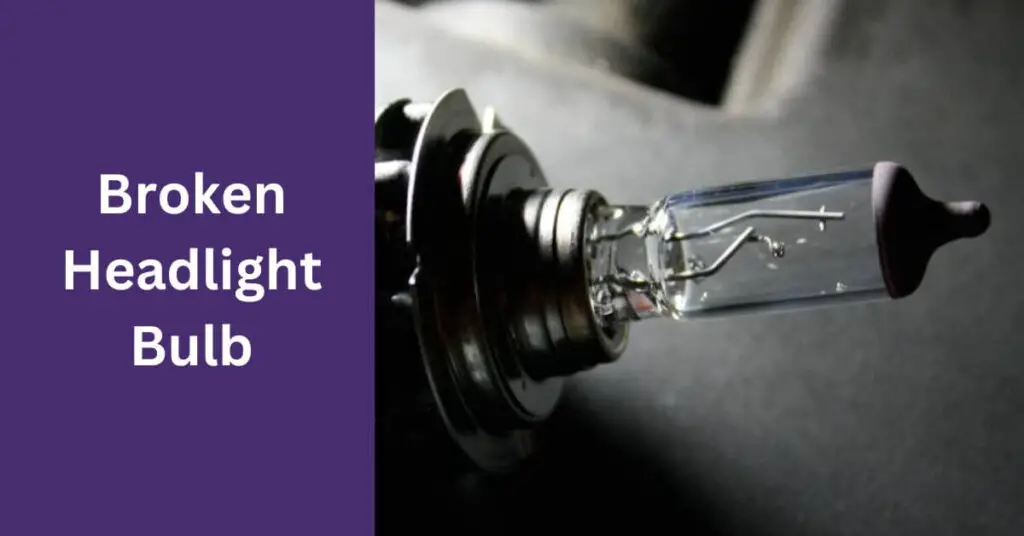
One of the most common causes of the BMW headlight not working is a broken headlight. This occurs when the filament inside the bulb burns out which results in a broken headlight bulb. Other factors that can cause a broken headlight bulb include incorrect installation, poor wiring, or a defective headlight bulb.
How to Fix it?
First, you must remove the old headlight bulb from the headlight assembly. Once the old bulb is removed, you can then install the new headlight bulb in its place. Make sure to connect the new headlight bulb in the same manner as the old one. Then check the wiring for any loose connections. Once everything is connected, you can then test the headlight for proper operation.
2) Faulty Xenon Light Control Unit
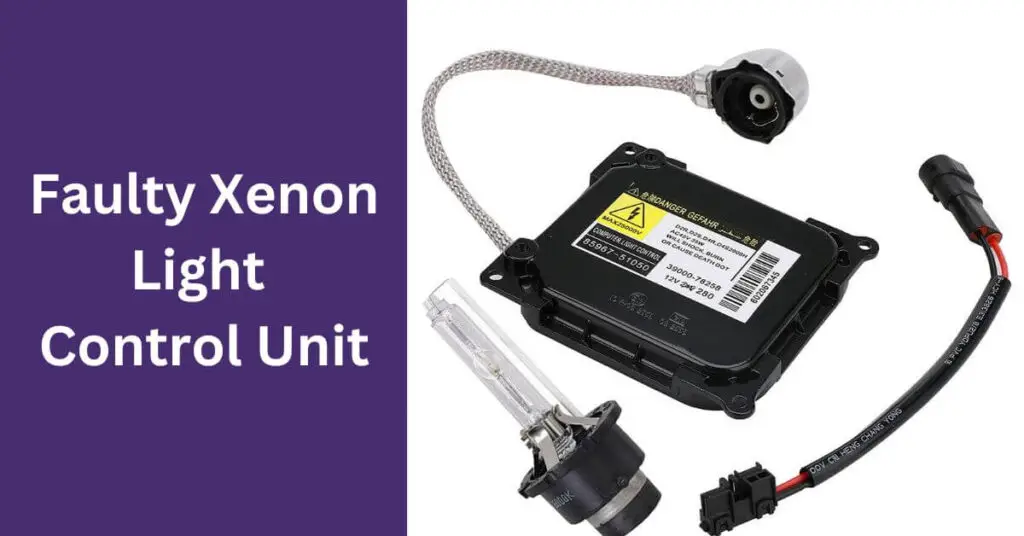
A BMW Headlights not working due to a xenon light control unit is a pretty common issue. A Xenon light control unit is a device that controls the brightness of the headlights on a BMW vehicle. This control unit works by adjusting the voltage of the headlight bulbs. When this unit fails, it will cause the BMW headlight not to work.
Common causes of Faulty Xenon Light Control Units are a faulty bulb, loose wiring, or a defective control unit. It can also be caused by a power surge or power failure because power failure can damage the circuit board.
How to Fix It?
First, find and replace the faulty bulb. If the problem persists, then check for loose wiring, power failure, and control unit. If the issue is a power surge or power failure, it is important to address this immediately to avoid further damage. If the problem is a defective control unit, then it may need to be replaced.
3) Damaged Power or Bulb Connector Plug
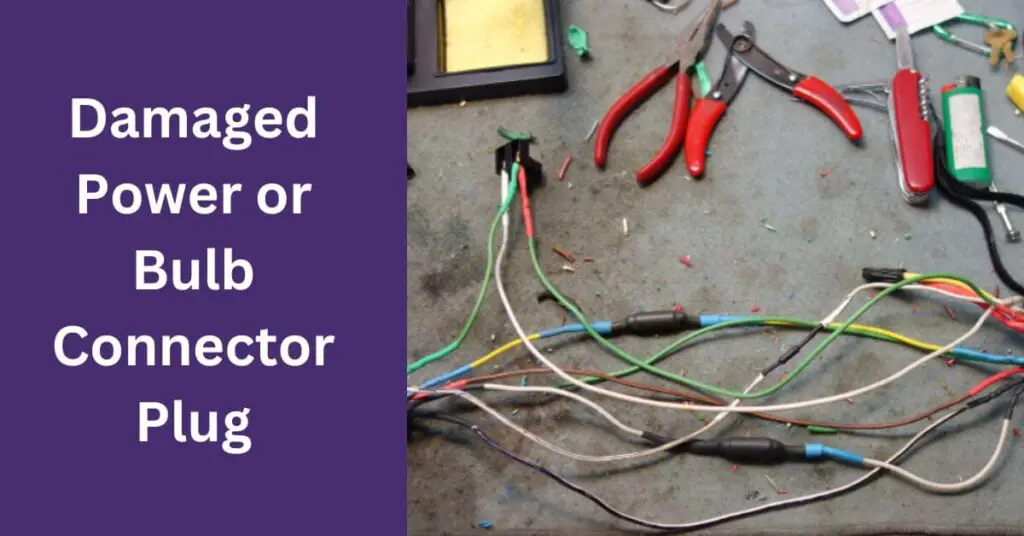
A bulb connector plug, also known as a bulb socket or lamp holder, is a device used to connect and hold light bulbs in place. It provides electrical contact for the bulb and allows it to be securely fixed to a light fixture. The bulb connector plug typically consists of a base, which is attached to the light fixture, and a socket, which holds the bulb.
If the bulb connector plug is not securely connected to the headlight bulb, it can cause intermittent or no lighting. Similarly, if the plug is damaged or corroded, it may not make proper contact with the bulb, resulting in poor or no illumination. The most common cause of a damaged power or bulb connector plug is moisture.
How to Fix It?
To Fix it, first, inspect the plug for any visible damage or corrosion. If there is any damage, it is important to replace the plug. If the plug appears to be in good condition, clean the plug with a wire brush. After that, inspect it for any loose or corroded terminals.
If any corrosion or loose terminals are found in the plug, it should be replaced. Once the new plug is installed, the headlight should be tested to ensure it is working properly.
4) Poor Light Quality
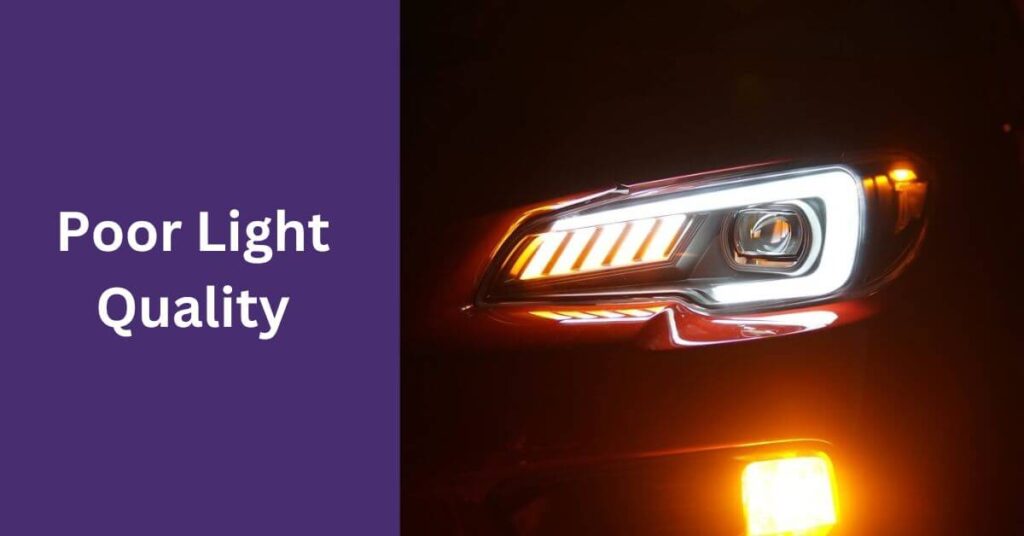
Another cause of the BMW Headlights not working issue is the poor light problem. The poor light problem refers to insufficient or inadequate lighting emitted by the headlights of a vehicle. This problem happens due to various reasons such as failure of the headlight bulbs or the headlight assembly.
Poor light quality can also be caused by a combination of factors such as corrosion, wear and tear, and the age of headlights. But Corrosion and wear and tear are the most common causes of poor light quality in BMW headlights. Corrosion is usually caused by water and dirt getting into the headlight housing. Wear and tear, on the other hand, is caused by the physical components of the headlight being exposed to the elements such as sun and wind.
How to Fix It?
The best way to fix poor light quality in BMW headlights is to replace the headlight assembly. This can be done by a professional mechanic, or if you are handy with tools, you can do it yourself. If you are going to do it yourself, you will need to buy a new headlight assembly, as well as the necessary tools and supplies to install it. Once the new headlight assembly is installed, the headlight should be able to produce a much better quality of light.
Headlight Problems in Other BMW Models:
- BMW Mini Headlight Problems
- BMW 1 series headlight Problems
- BMW Headlight Problems
- BMW 5 Series Headlight Problems
5) Blown Fuse
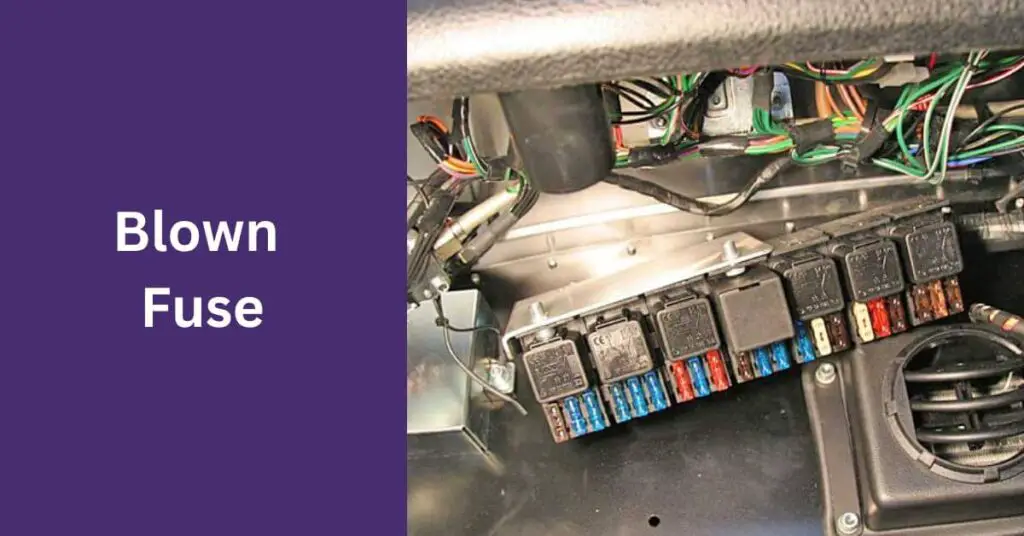
Another cause of the BMW headlight not working issue can be a blown fuse. A blown fuse refers to a situation where the fuse in an electrical circuit has failed or “blown” due to excessive current flow. A fuse is a safety device that is designed to protect electrical circuits from overloading and potential damage. When the current flowing through a circuit exceeds the limit of the fuse, it will melt or blow.
A blown fuse in a BMW headlight can be caused by a variety of issues. Some of the most common are a malfunctioning headlight bulb, an electrical wiring issue, or an overloaded circuit.
How to Fix It?
First, use a multimeter to test the fuses in the fuse box. Once the blown fuse has been identified, it can be replaced with a new one. If the problem is not solved, it is important to check for any additional issues, such as a faulty headlight bulb or wiring issue. If these issues are present, they should be fixed before the new fuse is installed.
6) Faulty Headlight Switch
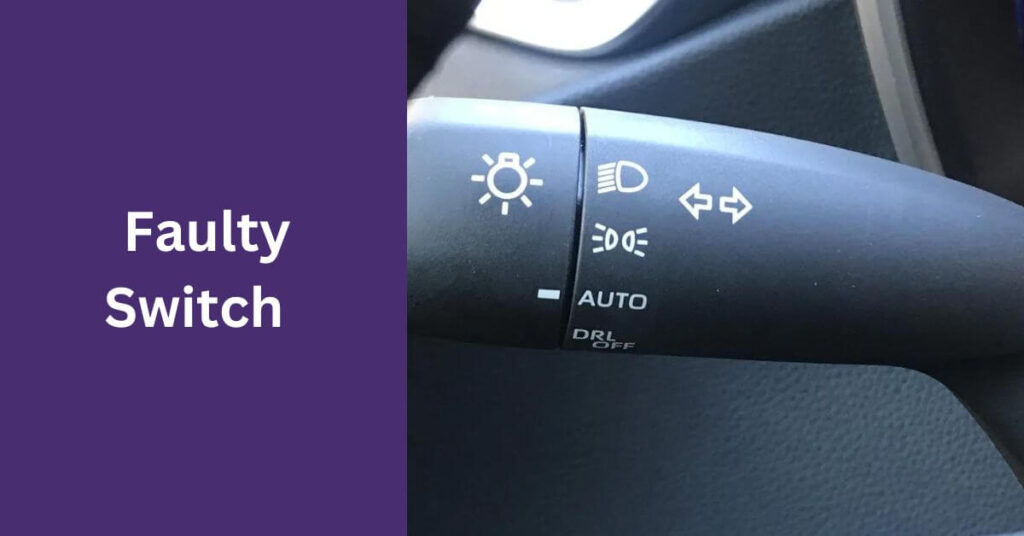
The BMW headlights not working due to faulty switch is another common problem with vehicles of this model. The headlight switch controls the headlights, running lights, turn signals, and other external lighting on the vehicle. When the switch is faulty, the headlights may not turn on or off. A faulty switch can be caused by several factors, such as an electrical short, a loose connection, or a worn-out switch. It can also be caused by dirt and debris that has built up in the switch or a worn-out contact.
How to Fix It?
The best way to fix a faulty switch is to replace it with a new one. If the switch is too difficult to remove, follow this video.
Once the switch is replaced, the headlights should be tested to ensure they are functioning properly.
8) Faulty Headlight Module
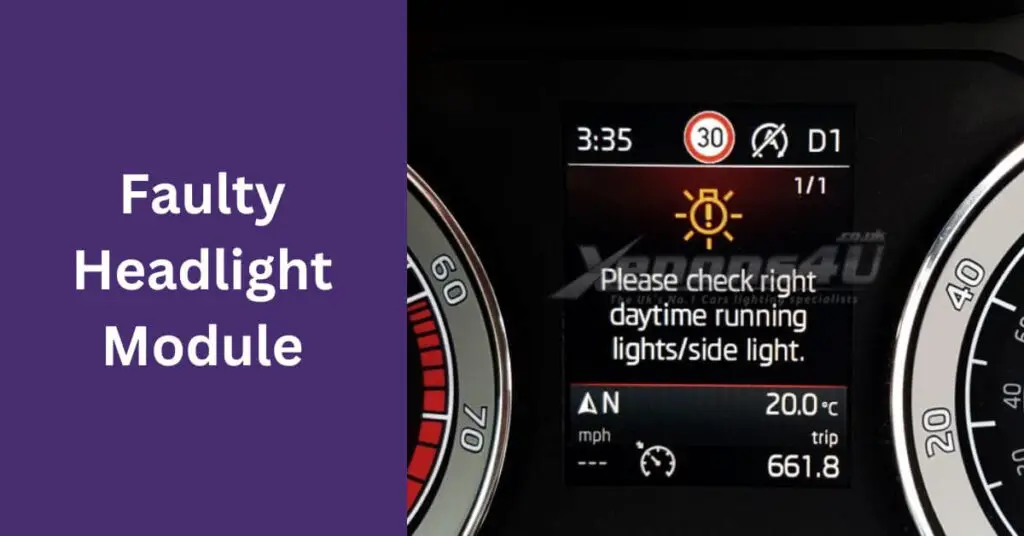
A headlight module is an electrical component that controls the operation of the headlights in a BMW. If this module is faulty, the headlight stops working altogether or becomes intermittent. A faulty headlight module also reduces visibility while driving at night or in low-light conditions.
Headlight module can become faulty due to factors such as age, wear and tear, and electrical issues. In some cases, the module may have simply failed due to normal use. In other cases, the module may be faulty due to a manufacturing defect.
How to Fix It?
The best way to fix a faulty headlight module is to replace it with a new one. This can be done by a professional mechanic or by a DIY enthusiast. Just like the guy does with his car in the video below:
If you are replacing the module yourself, make sure you have the correct part number. Also, make sure that the new module is compatible with your car model and year. Once the new module is installed, it should be tested to ensure it is working correctly. If the headlight is still not working, further diagnosis may be required.
9) Failed Headlight Motor
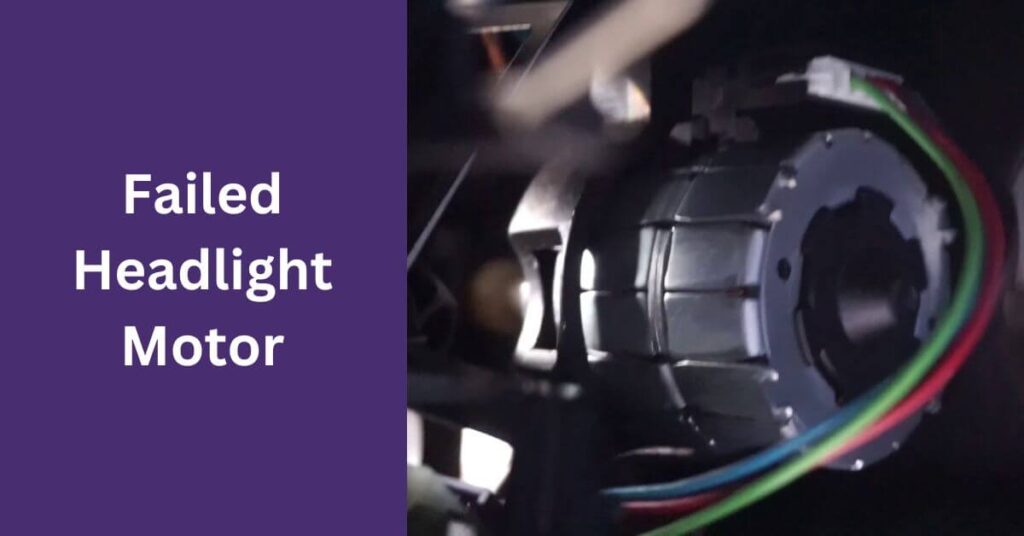
BMW Headlights Not Working Due to Faulty headlight motor is also pretty annoying. The headlight motor is responsible for controlling the movement of the headlights. It is located in the headlight assembly and connected to the headlight switch. When the headlight switch is turned on, the headlight motor moves the headlights up and down. This allows the driver to adjust the angle of the headlights. But when the headlight motor becomes faulty, the headlights stop working immediately.
The most common cause of a failed headlight motor is age and wear. Other common causes of a failed headlight motor can include a bad connection, faulty wiring, a defective switch, or a blown fuse.
How to Fix It?
The first step is to inspect the wiring and connections to see if there is any sign of damage. If the wiring appears to be in good condition, then the headlight motor will need to be replaced. To do this, remove the headlight assembly and disconnect the headlight motor. Then place the new headlight motor, place the headlight assembly back, and make the wiring secure.
Headlight Problems in Toyota Models:
- Toyota Auris headlight problems
- Toyota Land Cruiser headlight problems
- Toyota RAV4 headlight problems
FAQs
How much does it cost to fix a BMW headlight?
The cost of fixing a BMW headlight will depend on the root cause of the problem. If the problem is a blown fuse, then replacing it will be cheap. However, if the root cause is a corroded ground connection or a faulty wiring harness, then the cost could be higher. In most cases, the cost to repair a BMW headlight should be between $100 and $200.
Do I need to replace the entire headlight assembly if just one bulb is not working?
No, you do not need to replace the entire headlight assembly if just one bulb is not working. Depending on the model, you may be able to replace the individual bulb.
Are LED Upgrades A Viable Solution For BMW Headlights?
LED upgrades can be a viable solution for BMW headlights because LED technology offers several advantages over traditional halogen bulbs, such as increased brightness, improved visibility, and longer lifespan. LED bulbs are also more energy-efficient and have a cooler operating temperature.
What is the lifespan of a BMW headlight?
The lifespan of BMW headlights depends on several factors, including the type of bulb used, driving conditions, and maintenance. On average, halogen bulbs can last between 450 to 1,000 hours, while xenon HID bulbs have a lifespan of around 2,000 hours. LED bulbs, on the other hand, can last up to 25,000 hours or more.
Are The Headlight Problems And Solutions Mentioned Above Also Suitable For Other Models Of BMW?
Yes, all the above-mentioned problems and solutions are also applicable to all models of BMW from 2000 to 2024.
Conclusion
In conclusion, the BMW headlight problems are a little bit complex. But after reading the above article you will be able to resolve the BMW headlights not working dilemma. As, this article is full of knowledge and practical tips that will help you to effectively tackle these problems. If you have any questions, you can ask us in the comment section.
